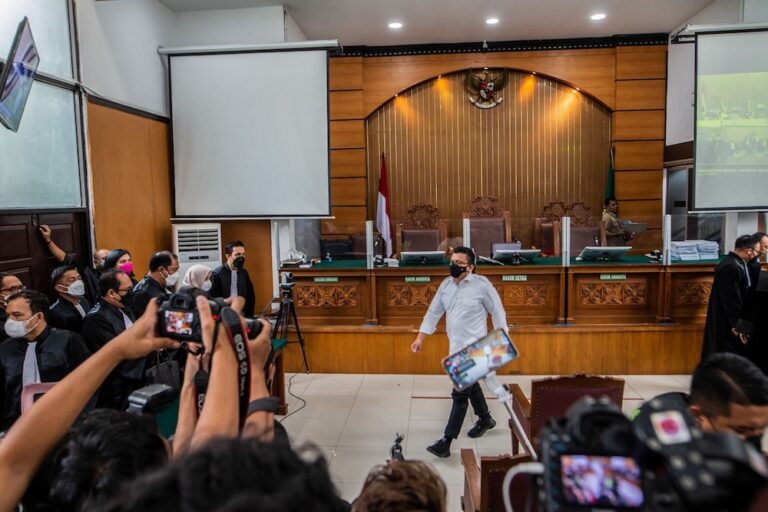(AJI/IFEX) – The following is a letter to Indonesian Foreign Affairs Minister Hasan Wirayudha by the Southeast Asian Press Alliance (SEAPA), of which AJI is a member: His Excellency Hasan Wirayudha Minister of Foreign Affairs Jl Pejambon 6 Central Jakarta Tel: +62 21 344 1508 Fax: +62 21 345 7782 / +62 21 381 3517 […]
(AJI/IFEX) – The following is a letter to Indonesian Foreign Affairs Minister Hasan Wirayudha by the Southeast Asian Press Alliance (SEAPA), of which AJI is a member:
His Excellency
Hasan Wirayudha
Minister of Foreign Affairs
Jl Pejambon 6
Central Jakarta
Tel: +62 21 344 1508
Fax: +62 21 345 7782 / +62 21 381 3517 / +62 21 385 8055
Your Excellency,
The Southeast Asian Press Alliance (SEAPA) condemns the Indonesian government’s refusal to renew the work permit for Australian journalist Lindsay Murdoch. On March 10 2002, the Department of Foreign Affairs (Deplu) denied Murdoch’s application for a journalist visa, therefore barring him from reporting for his Fairfax Group papers – The Sydney Morning Herald and The Melbourne Age – as per that date.
Murdoch first attempted to renew his journalist visa in November 2001, as his work permit was to expire on December 10 last year. The Department of Foreign Affairs immediately responded, faxing a statement to The Sydney Morning Herald headquarters, in which it “appealed” to the paper to nominate a different candidate to replace the foreign correspondent.
Murdoch and Fairfax complained. Australian Foreign Minister Alexander Downer and Australian Ambassador for Indonesia Richard Smith joined the protest. However, Deplu was not able to produce an explanation, although finally granting Murdoch a three-month extension. In the view of the Department, that was enough time for Fairfax to sort out a replacement.
As his extension was running to an end on March 10 2002, Murdoch flew to Singapore to try to obtain a journalist permit. He got a multiple business visa for the next 12 months, however. Murdoch later argued with Deplu’s Director of Information and Media Wahid Supriyadi, saying that journalism is a business, therefore he should be allowed to report with a business visa. But Supriyadi said no.
“If we find out you are still working as a journalist, then you will be deported,” Supriyadi told the journalist.
Though an official explanation has never been revealed, Supriyadi told the journalist that an “interdepartmental committee” had recommended the rejection, citing two stories written by Murdoch on Aceh and East Timor.
On May 14 2001, Murdoch reported on an armed forces (TNI) soldier who poured boiled water on a baby, in front of the mother, at a Free Aceh Movement (GAM) village. At the same time, Murdoch and his paper also filed a complaint with the military for assaulting a Sydney Morning Herald fixer in Medan, North Sumatera.
The second story cited by Deplu was Murdoch’s report on East Timor’s lost generation, published on June 18 2001. The story revolves around the fate of 130 East Timorese children, taken from West Timor refugee camps, and placed in orphanages in Java.
The journalist said the two articles might have angered the TNI. Sources said Deplu regarded the stories as fabricated.
SEAPA has recorded an earlier obstruction of journalistic work for foreign press on January 26 2001, when Deplu prohibited all foreign journalists from reporting in Aceh, Maluku and Papua. Going further back in time to April 1986, Murdoch’s colleague at The Sydney Morning Herald, David Jenkins, was the target of an even tougher action. Jenkins was told to leave the country and blacklisted for his article comparing the “millions” of the ousted Philippine President to the “billions” of the then Indonesian President Soeharto.
SEAPA is alarmed with Deplu’s rejection, and even more so angered, as foreign-journalist-banning seems to be the growing trend in Southeast Asia. Thailand’s Thaksin government started the move by banning Far Eastern Economic Review journalists in February, PM Mahatir followed with disallowing a number of foreign magazines from entering Malaysia, and now Indonesia is barring Lindsay Murdoch, a veteran journalist of 28 years.
SEAPA, along with other press organisations committed to press freedom, will investigate the reason further, and demands that the Megawati government stop all obstructions of press freedom. SEAPA would like to remind the government that this visa rejection is damaging the country’s reputation, as the press goes back to the suppressive Soeharto regime.
Yours truly,
Lukas Luwarso
Country Director
Solahudin
Advocacy Coordinator
Recommended Action
Similar appeals can be sent to:
His Excellency Hasan Wirayudha
Minister of Foreign Affairs
Jl Pejambon 6
Central Jakarta
Indonesia
Tel: +62 21 344 1508
Fax: +62 21 345 7782 / +62 21 381 3517 / +62 21 385 8055
Please copy appeals to the source if possible.


